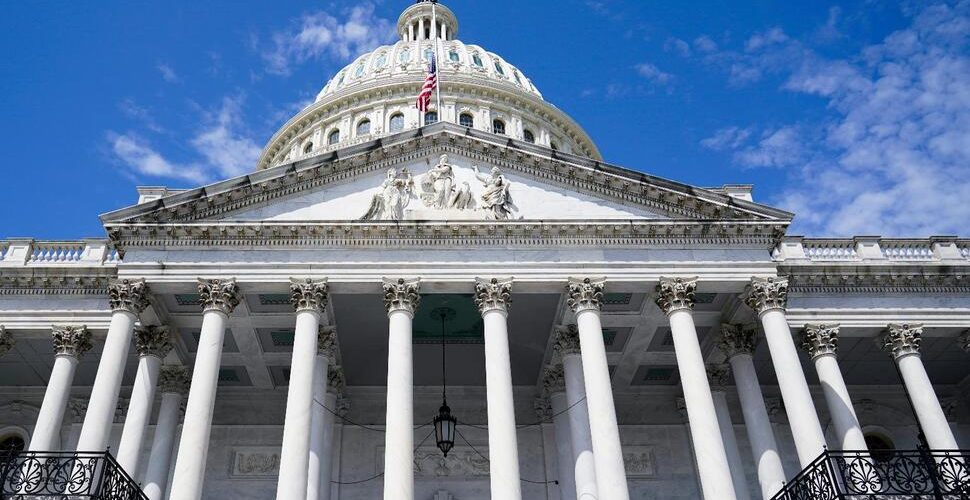Senate Democrats voted Sunday to approve a landmark climate, health care and tax bill that is set to deliver on years-long Democratic Party promises in a marathon weekend vote that caps off major legislative momentum in recent days as lawmakers prepared to leave town for August recess.
“The Senate is making history. I am confident the Inflation Reduction Act will endure as one of the defining legislative feats of the 21st century,” Senate Majority Leader Chuck Schumer of New York said of the bill’s passage.
The party-line vote, which came after hours of debate on Saturday and a “vote-a-rama” on amendments to the $740 billion bill that stretched overnight and into the afternoon on Sunday, is the result of months of negotiations that led to the bill’s revival in recent weeks after a deal between Schumer and Sen. Joe Manchin of West Virginia.
Manchin had been one of two Democratic senators who blocked President Joe Biden’s similar, but even more ambitious, measure called the Build Back Better Act in recent months over cost concerns. That plan was almost 10 times larger and included money for child care, universal preschool and paid family leave.
Support from Manchin – and later the other Democratic holdout, Sen. Kyrsten Sinema of Arizona – was a breakthrough for Democrats with a razor-thin majority in the Senate, giving each Democratic lawmaker the power to make or break the high-stakes legislation. They were critical to passing the bill that gives Democrats a boost heading into midterm elections just three months away in which control of both congressional chambers will be at stake.
Senators used a procedural maneuver called reconciliation that allows passage of certain budget-related legislation on a simple majority rather than the 60 votes ordinarily required to end debate to move the legislation forward. Vice President Kamala Harris served as the tie-breaking vote in the 50-50 Senate.
“This legislation is long overdue and is critically important,” Harris said after casting her vote to start debate on the bill Saturday.
In addition to securing support of their entire caucus, Democrats walked a fine line as they awaited word from the Senate parliamentarian this week, who determines whether the components of the bill are in compliance with the reconciliation requirements.
But as the weekend approached, the stars began to align for Democrats – when they secured the support of Sinema, albeit with some concessions, and heard back from the parliamentarian that for the most part, their legislation could move forward.
Still, Republicans did not appear eager to let the bill pass without a fight. And Sen. Lindsey Graham of South Carolina pledged on Friday that the vote-a-rama will “be like hell” for Democrats.
“Democrats have already robbed American families once through inflation, and now their solution is to rob American families a second time,” Senate Minority Leader Mitch McConnell of Kentucky said.
GOP Senators introduced dozens of amendments to intrigue their Democratic colleagues or force them to make a hard choice with their vote – from amendments related to immigration policy to regulating emissions. Democrats, many of whom had signed on to a plan to vote down all amendments in an effort to safeguard the bill, largely stayed united on the amendments. But a select few amendments garnered the support of a handful of lawmakers, including Sen. Bernie Sanders of Vermont, who introduced multiple amendments while arguing that the legislation, which he referred to as the “so-called Inflation Reduction Act,” should go further.
But GOP senators did succeed in stripping a proposed cap for out-of-pocket spending on insulin from the bill, after the Senate parliamentarian decided that it did not fall within the bounds of the reconciliation procedure and thus required a 60-vote threshold rather than a simple majority.
The measure, which was expected to raise enough money to pay for itself, includes provisions to tackle prescription drug prices, energy costs and corporate taxes and would mark a historic investment in climate protections, with a goal of reducing emissions 40% by 2030. Even so, it’s much narrower than the Build Back Better Act that the House adopted last year.
Biden called the bill, which is the centerpiece of his economic agenda, “the action the American people have been waiting for.”
“Today, Senate Democrats sided with American families over special interests,” he said in a statement. “I ran for President promising to make government work for working families again, and that is what this bill does – period.”
The bill now heads to the House, where lawmakers are expected to return from their August recess for a vote on the bill on Friday.





